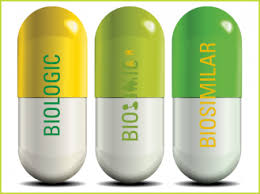 Most of us have become familiar with generic drugs. We now have a new category in your medicine cabinet called “biosimilars,” so I have again asked our Vice President, Steve Steiber, Ph.D., to talk to us about what we may not know – but should know if you are a caregiver to an older loved one – about the evolving federal rules and science around biologic medicines and the new medicines who are enough like them to get FDA approval. Steve has over twenty years of experience as a consultant to the pharmaceutical and biologic industry prior to joining us at Creative Care Management:
Most of us have become familiar with generic drugs. We now have a new category in your medicine cabinet called “biosimilars,” so I have again asked our Vice President, Steve Steiber, Ph.D., to talk to us about what we may not know – but should know if you are a caregiver to an older loved one – about the evolving federal rules and science around biologic medicines and the new medicines who are enough like them to get FDA approval. Steve has over twenty years of experience as a consultant to the pharmaceutical and biologic industry prior to joining us at Creative Care Management:
We all have heard of some of the (mostly) injectable medicines that have changed the lives of people with rheumatoid arthritis, Crohn’s disease, psoriatic arthritis and some other conditions that are part of a larger category called autoimmune diseases. They have been around for about twenty years and have become names many of us know from television and magazine ads.
We also mostly know what a generic medicine is. It is the same chemical molecule as one that a drug company brought to market with a “brand name,” but it is manufactured by another company after that brand drug’s period of patent exclusivity expired. All drugs discovered by a company can be patented for 20 years so that no one can make and sell the same drug until that patent expires. Companies apply for patent protection well before they go to FDA for approval, so they do not have a full 20 years alone in the market following FDA approval. For instance, once Aleve’s patent expired, you had other companies flooding the market with naproxen sodium (the generic name of Aleve). And once Motrin’s patient expired you got ibuprofen, and Tylenol gave way to acetaminophen, and so on.
Well, one of the provisions of the Affordable Care Act (ACA) was to change the rules for biologics to be like that process. Before ACA changed those rules, any medicine patterned after one of those approved biologics like Humira, Remicade, Cimzia and others had to go through a process just like a new medicine. Now, like the generics, a medicine can apply to be a biosimilar to a brand medicine simply by proving it is as good as that medicine. Hence, the name biosimilar. Don’t ask me why they couldn’t call it “generic,” but it amounts to pretty much the same thing.
So, if you are a caregiver to an older loved one on a biologic, you may soon have a cheaper alternative available. Generics and biosimilars inevitably will be cheaper than the brands they are like. It also means that in most states the pharmacist can substitute the biosimilar for the brand medicine if you agree … even if your physician writes the branded name on the prescription slip.
Do your research so that you know the clinical evidence on the new biosimilars as you make that decision at the pharmacy or in a conversation with your care receiver’s doctor. Think of it as getting a BMW-performing car without the logo…and without the price tag. But ask your physician for their thoughts.
Charlotte Bishop is a Geriatric Care Manager and founder of Creative Care Management, certified professionals who are geriatric advocates, resources, counselors and friends to older adults and their families in metropolitan Chicago. Please email your questions to info@creativecaremanagement.com.







